Overview of Sustainability Solutions
As mentioned on the Services Page, after conducting a comprehensive survey on water and energy consumption, appliances, user habits, and behaviour, we then use Artificial Intelligence (AI), Internet of Things (IoT), and sophisticated statistical analysis to identify a cluster of optimal solutions, from which the customer can choose. These solutions often comprised a number of technologies or appliances:

1. Heat Pumps
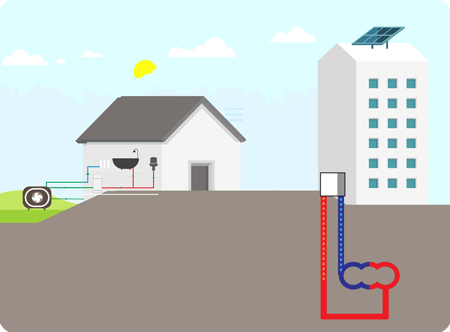
One of the main sustainability solutions that we offer is heat pumps, which is a low-carbon alternative for heating your home or business space by using electricity to generate heat rather than burning gas, whilst you can save on your energy bills. As the name suggests, air-source heat pumps use the heat in the air, water, or ground. There are multiple types of heat pumps, but the main two are air source and ground source heat pumps.
Benefits:
- Reduced carbon emissions, and the potential to be 100% carbon-free if paired with renewable energy generation systems
- Significant savings on energy bills
- Provides cooling as well as heating
- Long life span
- Lower running costs, mainly when gas prices are high
- Less maintenance compared to traditional heating methods
- Eligible for the RHI scheme
2. Solar Thermal & Building-Integrated Photovoltaic Systems
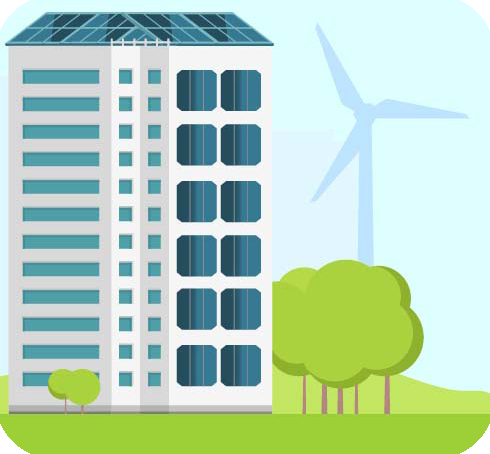
Several solutions, such as “solar thermal,” can be used alongside or instead of solar panels. Solar thermal uses the heat produced by the sun to heat water within the house’s heating system, storing hot water ready for use.
Building integrated photovoltaic systems encompass a range of different solutions, among which CAESL and its partners specialises in;
- Solar windows, balconies, and glasses
- Solar roofs
- Solar façade and cladding
Here at CAESL, we can assess your house or business using your current usage and Artificial Intelligence (AI) to determine which combination of solar panels, thermal systems, or building-integrated systems is best for your individual needs.
Benefits:
- Reduced carbon emissions, and the potential to be carbon neutralized
- Significant savings on energy bills
- Very low maintenance costs
3. Smart Controllers
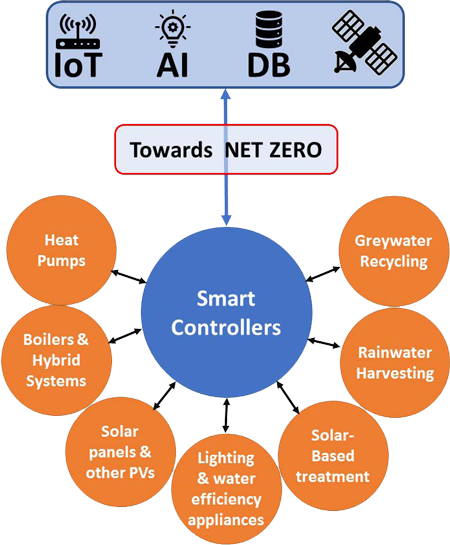
One of the main sustainability solutions that we offer is heat pumps, which is a low-carbon alternative for heating your home or business space by using electricity to generate heat rather than burning gas, whilst you can save on your energy bills. As the name suggests, air-source heat pumps use the heat in the air, water, or ground. There are multiple types of heat pumps, but the main two are air source and ground source heat pumps.
Benefits:
- Reduced carbon emissions, and the potential to be 100% carbon-free if paired with renewable energy generation systems
- Significant savings on energy bills
- Provides cooling as well as heating
- Long life span
- Lower running costs, mainly when gas prices are high
- Less maintenance compared to traditional heating methods
- Eligible for the RHI scheme
4. Grey Water Recycling (GWR)
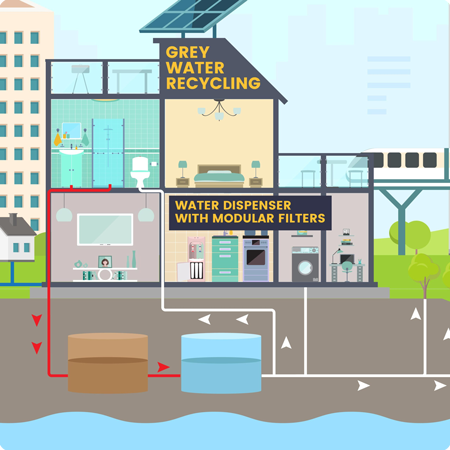
Greywater refers to any domestic wastewater produced, excluding black water (wastewater produced in the toilet). Black water contains a very high amount of organic matter compared to greywater. The proportion of greywater to the whole household wastewater varies depending on household characteristics and water use habits, but it is generally about 40 to 70% of a household’s wastewater.
Our team designs smart GWR systems powered by the Internet of Things(IoT) and Artificial Intelligence (AI); the smart GWR will consume much less energy than existing GWR systems in the market. It also helps direct the treated wastewater for reuse in different parts of the building when needed.
Benefits:
- Reduction in water use by 50 percent.
- Reduction in discharged wastewater to the sewerage
- Significant reduction in mains water and sewage bills (up to 50%)
- Shorter payback period compared to existing GWR systems in the market
- It can be combined with rainwater harvesting
- Tax savings
- No chemicals required
5. Smart Rainwater Harvesting
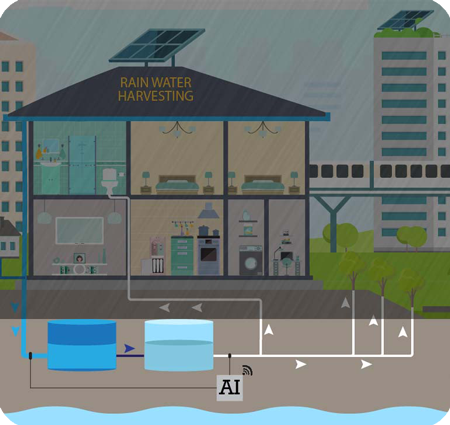
Rainwater harvesting refers to capturing and storing rain that falls on the roof of a building, usually in containers called water butts. In areas of high rainfall, the amount of rain captured is vast, particularly in buildings with large surface areas, as many businesses do. In a simple system, this water can be manually taken to the required places, such as for watering plants in a home. When filtered and connected to a treatment plant, the rainwater can be used for more practical applications such as laundry and toilet flushing.
Benefits:
- Very cheap to implement on a simple basis
- Result in significant water savings and as such reduced utility bills
- Reduction of carbon footprint
- Reduces the use of mains water
- Can be installed on virtually any structure
6. Train wash and car wash recycling
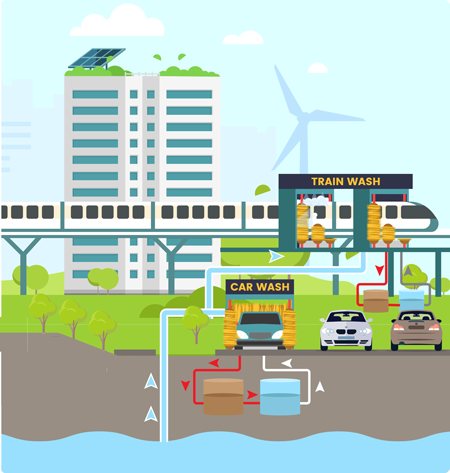
With the help of innovative technologies, this system allows you to re-use your entire commercial wastewater (from carwash or train wash) and enables you to capture savings while actively helping to preserve the environment.
Wash water is treated utilising three key stages. Heavy solids are firstly settled using an intensive sludge interceptor. Secondly, the water is passed through a cyclonic filter and activated granular carbon vessels to remove any organic compounds or chemicals.
Benefits:
- Reduces use of mains water
- Cuts costs of water usage
- Re-used water is as clean as mains water
- Promotes a healthy and environmentally friendly brand image
- Tax savings
7. Solar-based and low-energy water treatment systems

Solar-based water treatment systems have a wide range of applications in both the residential and commercial sectors. The scalability of the size of systems means that this could be used in any building, from small residential houses to large hotels. All the systems can run directly off solar panels and do not require a grid system to be in place; there are significant applications for remote areas which operate as a microgrid. This can generate clean drinking water or treatment of wastewater that would otherwise cause a health hazard.
Benefits:
- Improving the quality of mains water
- Zero electricity consumption
- Low maintenance
- Promoting sustainability
- Short payback period compared to many other water treatment systems
- Suitable for remote area deployment
